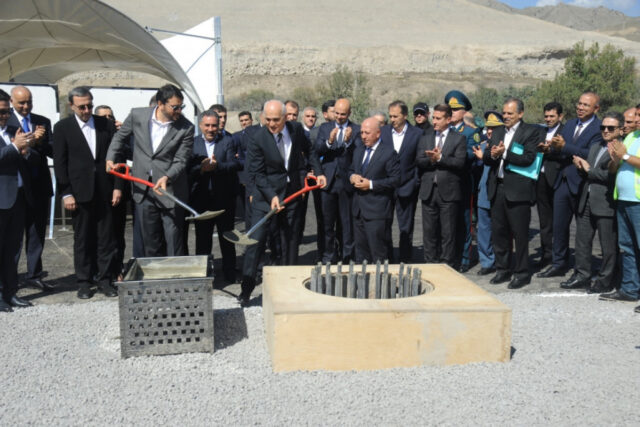
Aras Corridor Provides Problems and Solutions for Connectivity Issues in South Caucasus
Publication: Eurasia Daily Monitor Volume: 21 Issue: 3
By:

In December 2023, Iranian Minister of Roads and Urban Development Mehrdad Bazrpash announced that Iran and Azerbaijan would sign an official agreement on the development and opening of the Aras Corridor (Trend.az, December 18, 2023). Bazrpash stated that development of the corridor will begin with the construction of a bridge over the Aras River to connect with the planned motorway (Tasnim News, December 19, 2023). Before the agreement, construction of a road bridge connecting Azerbaijan and Iran passing over the Aras River had already begun on October 6. The corridor’s path will run between mainland Azerbaijan and its Nakhchivan exclave through Iran and will consist of a motorway, railway, and accompanying communication lines (Apa.az, October 6, 2023; Haqqin.az, October 24, 2023; Parstoday.ir, December 2, 2023). This breakthrough represents a potential thaw in Azerbaijani-Iranian relations. The relationship between Baku and Tehran had reached a historic low following Azerbaijan’s victory over Armenia in the Second Karabakh War (September 27–November 10, 2020) and Baku’s push to open the Zangezur Corridor. Yet, while the Aras Corridor purports to replace the controversial Zangezur Corridor, palpable challenges and risks remain in opening this passage.
The challenges primarily relate to the Aras Corridor’s railway leg. A functional motorway is already in operation between Azerbaijan and Nakhchivan via Iran. The motorway portion of the Aras Corridor will become an alternative and more suitable route by significantly reducing travel time. In contrast, the railway segment promises a completely different situation. At the moment, no functional railway connection exists between Azerbaijan and Nakhchivan. That said, a railway line from Nakhchivan to the Iranian city of Mashhad was inaugurated on December 29, 2016. Its operations were suspended, however, due to the COVID-19 pandemic in 2020 and have yet to be restored (Azertag.az, December 30, 2016).
The implications of further developing the Aras Corridor go far beyond just linking mainland Azerbaijan to Nakhchivan. Baku views the corridor through the lens of diversifying possible routes for the Middle Corridor, whereas Tehran frames it as a critical link for the International North-South Transport Corridor (INSTC). Azerbaijani President Ilham Aliyev has framed the Aras Corridor as “another extension of the Middle Corridor … through Zangilan, Iran, Nakhchivan, and again Türkiye.” Aliyev also told Iranian President Ebrahim Raisi that the corridor would be “another direction for the INSTC.” Baku considers the Aras Corridor as another link of the INSTC from the “Persian Gulf to Azerbaijan and then to Georgia” (President.az, November 9, December 6, 2023). Tehran’s drive, however, is to use the corridor to lay an Armenian leg of the INSTC from the Gulf to Armenia and Georgia (Al-monitor.com, December 2, 2023). This ambiguity reveals underlying differences between Baku and Tehran.
The Kars-Nakhchivan railway project further highlights Tehran’s and Baku’s diverging visions for the Aras Corridor. As part of the initiative, Azerbaijan and Türkiye have agreed to build a 224-kilometer railway link between Nakhchivan and the Turkish city of Kars. The Nakhchivan-Kars railway line is designed to serve as part of the Middle Corridor (Interfax.com, December 22, 2023). Baku hopes to gain railway access to Türkiye through the Azerbaijan-Iran-Nakhchivan railway segment of the Aras Corridor and the Nakhchivan-Kars railway connection. Tehran, however, plans to connect to Armenian railways by reviving the Soviet-era railway link from Nakhchivan to Yerevan, thus opening railway access to Georgia and the Black Sea (Inss.org.il, July 2021). That vision was highlighted by Iranian Foreign Minister Hossein Amir-Abdollahian’s pledge of support for Armenian Prime Minister Nikol Pashinyan’s “Crossroads of Peace” regional connectivity proposal (1lurer.am, December 27, 2023). Revival of the historic Yerevan-Nakhchivan railway link is a central element of Pashinyan’s proposal.
Complications with the railway leg of the Aras Corridor may hurt the project’s financing. Discussions on funding are ongoing between Azerbaijan and Iran, with a final agreement remaining elusive. Baku and Tehran had incidentally agreed on Azerbaijan’s funding of the Rasht-Astara railway as part of the INSTC in 2017 (see EDM, November 9, 2017). That agreement never materialized, and the construction of the railway still hangs in the balance. A similar fate may await the Aras railway link.
Azerbaijan’s recent backtracking from its position on the Zangezur Corridor does not translate into a complete withdrawal from that plan (Caucasus Watch, October 28, 2023). In recent weeks, Yerevan has sent positive signals regarding the opening of Zangezur (Armenian Weekly, January 10). One of Armenia’s major concerns is related to the possible deployment of Russian troops to secure the corridor. The Armenian government has also clarified that communication lines must remain under the sovereignty and jurisdiction of the host country—in this case, Armenia. As a manifestation of this principled stance, Yerevan created a special unit of the Armenian National Security Service to protect the proposed communication lines (Arka.am, November 2, 2023). Under the Armenian-Azerbaijani-Russian trilateral statement that ended the Second Karabakh War, however, Russian border troops are designated to protect any transit lines from mainland Azerbaijan to Nakhchivan running through Armenian territory.
Azerbaijan’s agreement to the work with Iran in developing the Aras Corridor may be cause for questions of Baku’s intentions. The agreement, nevertheless, gives the Azerbaijani government more room for handling other foreign policy priorities, including signing a peace agreement with Yerevan, deciding the fate of the Russian peacekeepers in the region, and easing international pressure regarding Azerbaijan’s alleged intention to invade Armenia to force open the Zangezur Corridor. Despite the complications, the Aras Corridor deal represents a realistic solution to the lack of an Azerbaijan-Nakhchivan connection and would provide a partial solution to major connectivity problem across the South Caucasus.



